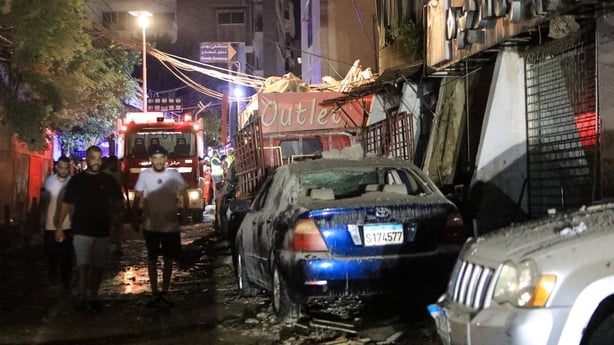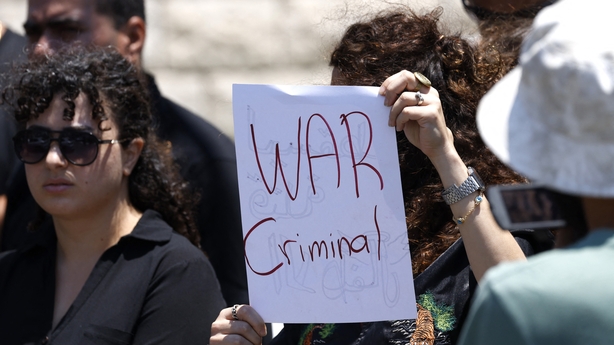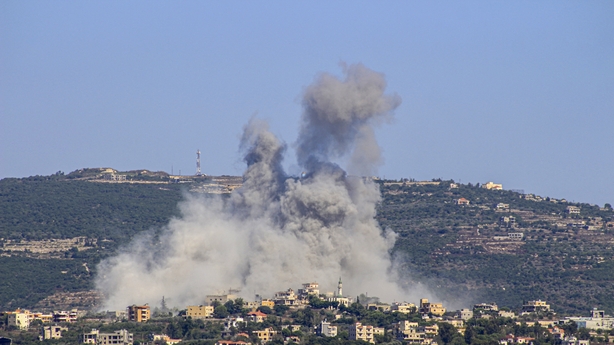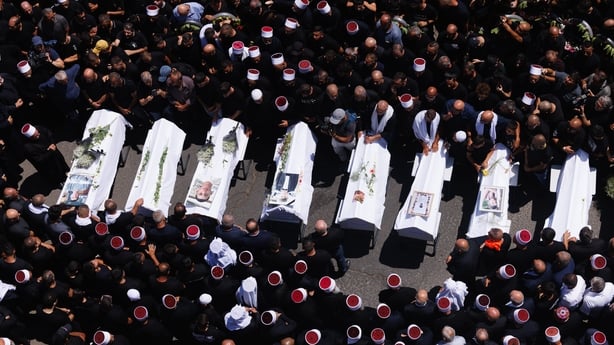The Israeli military said its fighter jets "eliminated" Hezbollah military commander Fuad Shukr in the area of Beirut, accusing him of being responsible for a rocket strike on the annexed Golan Heights.
"Israeli air force fighter jets eliminated the Hezbollah terrorist organisation's most senior military commander and the head of its strategic unit, Fuad Shukr, in the area of Beirut," the military said in a statement.
Two children were also killed in the strike, bringing the civilian death toll to three, medical and security sources told Reuters.
"Fuad Shukr was the commander responsible for the Majdal Shams massacre, in which 12 children were murdered after Hezbollah fired an Iranian Falaq-1 rocket directly at a soccer field in northern Israel on Saturday evening," Israeli Military Spokesman Rear Admiral Daniel Hagari said in a separate video statement.
"Fuad Shukr was the right-hand man to Hassan Nasrallah, Hezbollah's leader and his advisor in planning and directing attacks and operations."
Mr Hagari said the Hezbollah military commander was a "senior terrorist who has the blood of Israelis and many others on his hands".
Read more about the conflict in the Middle East
A loud blast was heard and a plume of smoke could be seen rising above the southern suburbs - a stronghold of Lebanese armed group Hezbollah - at around 7.40pm local time (5.40pm Irish time), a Reuters witness said.
Lebanon's state-run national news agency said an Israeli strike had targeted the area around Hezbollah's Shura Council in the Haret Hreik neighbourhood of the capital.
The UN's special coordinator for Lebanon voiced concern after the strike on Beirut's southern suburbs, which she said resulted in multiple civilian casualties.
"UN Special Coordinator Jeanine Hennis-Plasschaert is deeply concerned by tonight's strike," the envoy's office said in a statement, adding that she "underscores once again that there is no such thing as a military solution" to the ongoing conflict
The military said that since the start of the Gaza war, Mr Shukr has directed Hezbollah's attacks on Israel.
The Hezbollah commander was responsible for the majority of the group's most advanced weaponry, including precise-guided missiles, cruise missiles, anti-ship missiles, long-range rockets and UAVs, it added.
The military said that in the 1990s the Hezbollah commander was "directly involved" in the abduction of the bodies of three Israeli soldiers -- Benyamin Avraham, Adi Avitan and Omar Sawaid.
The three were killed by Hezbollah while patrolling the security fence adjacent to Har Dov, the military said.
"Since then, he has planned and directed numerous terror attacks against innocent civilians," it said.
While Israel wanted to end hostilities without any wider war with Hezbollah, its forces were ready for "any scenario," Mr Hagari said.
"Hezbollah's ongoing aggression and brutal attacks are dragging the people of Lebanon and the entire Middle East into a wider escalation," he said.
"While we prefer to resolve hostilities without a wider war, the IDF (Israeli army) is fully prepared for any scenario."

Beirut has been on edge for days ahead of an anticipated Israeli attack in retaliation for a strike on the Israeli-occupied Golan Heights that killed a dozen youngsters.
Israel and the United States have blamed Hezbollah for the attack.
Hezbollah has denied responsibility.
Earlier, Druze residents of the Golan Heights had distanced themselves from Israeli threats to retaliate against Hezbollah for the deadly rocket strike last weekend.
Most of Majdal Shams's 11,000 residents still identify as Syrian more than half a century after Israel seized the Golan Heights from Syria and later annexed it in a move not recognised by the international community.
On a visit to the town yesterday, Prime Minister Benjamin Netanyahu vowed Israel would deliver a "severe response" to the strike.
This morning the Israeli army said it had struck around 10 Hezbollah targets overnight and killed one of the Iran-backed group's fighters.
Scores of Majdal Shams residents had come out to protest Mr Netanyahu's visit, many donning traditional Druze caps.
The hawkish prime minister arrived hours after hundreds of mourners had joined the funeral procession for one of the children killed, Guevara Ibrahim, 11.

In a statement issued after his visit, Druze lay and religious leaders said the community rejects the "attempt to exploit the name of Majdal Shams as a political platform at the expense of the blood of our children".
Israel wants to hurt Hezbollah but not drag the Middle East into all-out war, two Israeli officials have said, as Lebanon braced for retaliation this morning.
Two other Israeli officials said Israel was preparing for the possibility of a few days of fighting.
Iran's President Masoud Pezeshkian said any Israeli attack on Lebanon would have "serious consequences" for Israel, Iranian state media quoted him as telling French President Emmanuel Macron in a phone call. Mr Pezeshkian did not elaborate.
All four Israeli officials, who included a senior defence official and a diplomatic source, spoke to Reuters on condition of anonymity and gave no further information about Israel's plans for retaliation.
"The estimation is that the response will not lead to an all-out war," said the diplomatic source. "That would not be in our interest at this point."

In a statement issued by his office yesterday after he visited Majdal Shams, Mr Netanyahu said: "The state of Israel will not and cannot let this pass. Our response will come, and it will be harsh."
Both Israel and heavily armed Hezbollah have appeared at pains to avoid a full-scale war since they began trading blows in October.
The United States is leading a diplomatic dash to deter Israel from striking Lebanon's capital Beirut or major civil infrastructure, five people with knowledge of the matter said.
The focus of the high-speed diplomacy has been to constrain Israel's response by urging it against targeting densely populated Beirut, the southern suburbs of the city that form Hezbollah's heartland or key infrastructure like airports and bridges, the sources said.

However, Saturday's incident has increased concerns that the months of cross-border hostilities could spiral into a broader, more destructive war.
An Israeli drone strike killed two Hezbollah fighters in south Lebanon yesterday as well as three other people including an infant, sources said. They were the first fatalities in Lebanon since Saturday's incident.
The Israeli military said its air defences downed a drone that crossed from Lebanon into the Western Galilee area yesterday.

